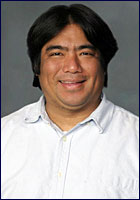The International Church
Yesterday I went to church at Kowloon International Baptist Church, which has services in English, and is right next to campus.I, like most Evangelicals, do not see sharp distinctions between many Protestant denominations, so in case you thought I was a Presbyterian just because I'm a member of Malibu Presbyterian Church, and serve as an Elder there, be warned: when I was saved I went to a Congregationalist church, when I went to college I went to a Baptist church, and when I went to grad school I went to the independent Peninsula Bible Church.
What is an Evangelical? There seem to be many definitions out there. It's not a denomination. It's not an organization. It's not even a list of doctrines, per se. It's a vague term that people use to identify themselves with other like-minded people. We're Chrisians, first of all, but within the scope of Christianity, the main emphases of Evangelical Christianity include: the need for personal salvation, that this is available through the death and resurrection of Jesus through faith and not the believer's works, that this brings us into a relationship to Jesus, the ultimate authority of the Holy Bible, and so on.
When I say I am an Evangelical, I associate with these emphases. An Evangelical is also a subculture, in that we have some common jargon ("Are you saved?", "Are you in a small group?", etc.) and as evidenced by the fact that we hear the same urban legends, for instance.
The term also gets used for a bunch of things I don't identify with: Creationism, right-wing politics (in the US), the "I've got the answers because I'm saved and you have nothing to offer me because you're not" attitude that sometimes is the flip side to the emphasis on personal salvation, and so on.
So Kowloon International Baptist Church (KIBC) is definitely an Evangelical church. Definitely along the lines I agree with. I even recognized most of the songs we sang. In a way, it felt very much like churches I'm used to. In a way, comforting. In a way, puzzling.
I've been reading a book by Covell on the history of Christianity in China (I'll get the title to you later--it's not in front of me now). It was written in the 1980s, so it doesn't have the most recent developments which are new and surprising. But from his perspective, Christianity has failed to take hold of China. The reason he gives: from the Nestorians to the Jesuits to the Protestants to the 20th century house churches, they brought their own culture and tied it too closely with Christianity. They failed to create a Chinese Christianity. And thus, Christianity was always seen as "foreign", unlike Buddhism which was just as foreign, but became seen as truly Chinese.
Now, of course, KIBC is not there to serve the local Hong Kong Chrisitans as much as serve the people from abroad. But this includes Filipina domestic servants, Mainland Chinese, and even a few people with roots in Hong Kong but grew up in other parts of the world. There were even some Hong Kong people there. But in light of this, why should it have been as comfortable as it was? Why so American?
I got to know a few people there, especially in the college/post-college group, and we had lunch together. The new youth/college minister, Maik Friedrich, is from Germany (though he did his theological training at Baylor), and he led the group. He has theological depth and a kind of accessibility about him, and he is sure to do a good job. The group is mostly ethnic Chinese, though most were not born in Hong Kong. A few were, though, which I found a bit surprising.
This seems to be the story: In the 1970s, Hong Kong experienced a rapid growth in its economy, largely because of globalization and the opening of the Mainland Chinese market. This allowed a certain segment of Hong Kong society to grow into a kind of middle class. In the 1980s, as talk began of the handover of Hong Kong back to China, people were uncertain of the future and moved, or sent their children, to the West to get educated. Some of these kids came back to Hong Kong, though they were more comfortable with English than Cantonese. These folks preferred an English-speaking church.
More on the church later. I'm going to go with the HKBU staff to pick up the Pepperdine students from the airport.


0 Comments:
Post a Comment
<< Home